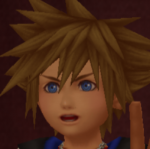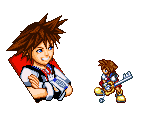- Joined
- Nov 1, 2009
- Messages
- 17,750
- Awards
- 36
In this interview, the key members of the Scenario and Graphics Team discuss writing the story for Chain of Memories, directing cutscenes while dealing with the limitations of the GBA and their favorite scenes.
As always, many thanks to goldpanner for her hard work in translating! If you'd like to say thanks, please consider buying her a coffee!
Interviewees (L-R):
Tatsuya Kando, Animation Director
Previous Works: KINGDOM HEARTS, FINAL FANTASY VII, VIII, IX, Parasite EveRyou Tsurumaki, Event Planner
Previous Works: KINGDOM HEARTS, FINAL FANTASY VIII, Chrono CrossDaisuke Watanabe, Scenario Writer
Previous Works: KINGDOM HEARTS, FINAL FANTASY X, X-2, X-2 Last Mission, Threads of FateTomohiro Hasegawa, Character Art Director
Previous Works: FINAL FANTASY VIII, IX, X, X-2, SaGa FrontierThe line in Side Sora I wanted to write the most
—How did work begin on the scenario?
Watanabe: It began last year (2003) around the time of Golden Week (T/N: early May), when Nomura told me the rough concept: it'd start after the ending of the previous game, the story would be related to memories, that you'd climb a Castle Oblivion with 13 floors, that at the end Namine would give you a big choice, and that it would connect to Kingdom Hearts II. It happened to be right after I had just finished writing the scenario for FFX-2 Last Mission, and I remember thinking, another story about climbing to the top of a thing!? (laughs). Also, he told me that a couple of people from an "Organization" would appear, and that there would actually be a Side Riku too. I thought of a story that would work within that scaffold.
—Was it difficult, having so many characters to include?
Watanabe: Since this is a game where you get to explore various worlds in the order you choose, it raised difficulties in controlling the order of the story, so I did stress over how to involve the characters as you progress. Also, a portion of the cutscenes had to go in a set format, so after trial and error I found a way to make the scenario flow between those decided points. I can say this now, it was the biggest slump I'd experienced since starting my career as a scenario writer.
—There are two stories: Side Sora and Side Riku. The two feel very different, don't they?
Watanabe: I was allowed free reign for Side Riku. Since there's no Donald or Goofy, I felt that Riku's individual growth had to carry the story, and I went with a plot about light and darkness. The way things ended for Riku in first game honestly for me left a lot to be desired. My own personal wish was to give Riku as a character more time to shine.
—What were your thoughts while writing Side Sora?
Watanabe: At a certain point, Sora finds out what Namine has done to him. After this, he says something like, "Even so, you're my friend, Namine. So I'm happier when you're smiling." That was the piece of dialogue I wanted to write the most in the whole game. That scene crystallized inside me, and finally broke me free of that long slump.
—The scenario you wrote for FFX-2 Last Mission was interwoven with a theme that was something like: even if things aren't going well right now, the fun moments from the past are solid, and they won't fade. I feel like it works here too.
Watanabe: You're absolutely correct. That feeling of happiness from having met someone - even if it is based on lies or misunderstanding, the fact that you were happy was still real. To be unwavering about the truth here and reject the happiness you felt as "fake" is sad, I think.
—The Riku Replica has a similar theme, doesn't he. Even if everything was fake, the fact that he existed was still real.
Watanabe: Yes, that's right. Those things are connected, in my mind. I've been using the word "connected" a lot recently. I think I got it from Sora in the first game, when he says "the hearts connected to mine are my power" (TN: localized as "my friends are my power" in the English version). That line popped into my head out of nowhere when I was writing the scenario for that game, and I realized how much I like the word "connect." It stayed with me and influenced my work on this game and on FFX-2.
First attempt at developing a handheld game
—The cutscenes are an important feature of this game. What was the process behind making them?
Tsurumaki: Using the finished scenario, we designated motions and expressions for the characters for each line. Then, we took this to Jupiter, the development company, who programmed it for us. We stressed a lot over the halls on each floor of Castle Oblivion. Since the maps all look the same, it took a lot of effort to differentiate them using character movement and such.
Hasegawa: We put a lot of thought into the layout of the screen, such as how and where to position the little character sprites doing the acting and the facial talk-sprites that appear during conversations on the screen.
Watanabe: On the beginning we had lots of ideas on the screen design. We considered doing the dialogue with speech bubbles.
—Cutscene directing would have been very different from this 2D game compared to the first 3D game, right?
Watanabe: I mean, this was the first handheld game this group here had ever developed. Up until now, I'd only ever worked on 3D games. The thing that gave me the most trouble was that I couldn't use camera work when directing.
Tsurumaki: You can't swap between camera angles when working with 2D, so you end up filming the same shot for stretches. One thing that gave me trouble was finding ways to create room to breathe. In the end, the people in charge of the talk-sprites did a lot of the heavy lifting for me, I am very thankful.
Hasegawa: You could say they did too much lifting for you: despite using a high capacity 256MB cartridge, towards the end we ran out of space and I had to ask him to stop ordering any more expressions (laughs). Right up to the end we were still adjusting which expressions we could re-use where and which scenes actually needed more expressions.
Watanabe: Due to capacity issues, there are some characters who didn't get different expression talk-sprites. We weren't sure what to do, but since one character was fainted the whole time anyway we thought we could get away with not giving them one, even though it's obvious who (laughs).
What is the biggest secret in this game?
ーDo you have a favorite cutscenes, Tsurumaki?
Tsurumaki: In the final cutscene room in Olympus Coliseum, I think the scene that starts when Hercules and and Cloud face off came out pretty well.
Watanabe: And it even finishes with his signature "Not interested" pose.
Hasegawa: Flashy direction doesn't really suit Cloud, so it was difficult to create that pose. When making his hair flip, if we made the movement too exaggerated it wouldn't be Cloud-like enough, but if we made it too subtle it would be too hard to tell what the movement was meant to be. We had an astounding number of back-and-forths with Jupiter over this. Nomura kept telling us we weren't nailing his expression, too, so there were a lot of retake of that.
Watanabe: This could also be said of all games in the series, but with this game each character was only going to have a small amount of screen time, so we had to make sure they got as many juicy parts as possible in the limited number of scenes they had. We worked hard to create as many parts as possible that would make the players grin, like Cloud's "Not interested".
Kando: I personally like the scenes that show the "Organization" members doing things behind the scenes. It adds to the vibe that this game is more complex and difficult than the previous one. Plus, those scenes help make the game feel fully fleshed out.
Watanabe: It was very easy to think of scenes for the "Organization" people. I love writing those kinds of conversations between people with terrible personalities, and scenes where true intentions come to light (laughs).
Hasegawa: For me personally, Larxene's introductory scene packed a lot of punch. I'd worked on her sprites first, and got the scenario later. I was surprised at what kind of person she was.
Watanabe: One time Nomura rang me up in the middle of the night to ask out of the blue, "What are these Organization guys like?" I explained them to him like "Larxene is an extremely terrible person," "Zexion is like the tactician," "Vexen is usually calm but snaps easily" and such.
Tsurumaki: When I first read the scenario, Larxene's lines popped off the page. I could tell then you had a blast writing her (laughs).
Watanabe: It's because this game isn't voiced. When writing for something that will be voiced, you have to be a little more restrained with the wording, to give the voice actor room to act with abandon. But since we couldn't rely on voice actors' performances this time, we had nothing but the letters of the words themselves to convey the characters. I had no choice but to write with abandon instead. Compare that to FFX, where the characters had exaggerated manners of speech.
ーSpeaking of voice work, your name appears in the credits as a voice actor, doesn't it, Kando?
Kando: (Panicking) That's top secret.
Hasegawa: We will leave exactly who a secret, but we will say that he was responsible for several characters.
ーKando, you made ur debut as the motion capture actor for Tinkerbell's hands and the Large Body's movements in the first game, didn't you? And now for this game, you've made your debut as a voice actor.
Kando: There are characters who appear in battles but didn't have any voices in the early stages of development. We thought it would be more interesting to give them some kind of vocal effects, but it would have been too much to bring out a voice actor just for those tiny battles scenes…
Hasegawa: Every time voice casting came up, Kando would offer himself (laughs).
Kando: No, no, I just put it out there as a joke (laughs).
Secrets of this title that only they know:
Watanabe:
In Side Riku, secret information on the Organization members etc. is contained in records called the D Reports. These reports were all written by one character who appears in this game. Enjoy guessing who on earth "he" could be, and whose side he is on.Tsurumaki:
We ordered a smiling face talk-sprite to use for conversations with Leon, but it felt out of place so we cut it. I wanted to show a slice of his kindness, though… I named it the "phantom smile."





